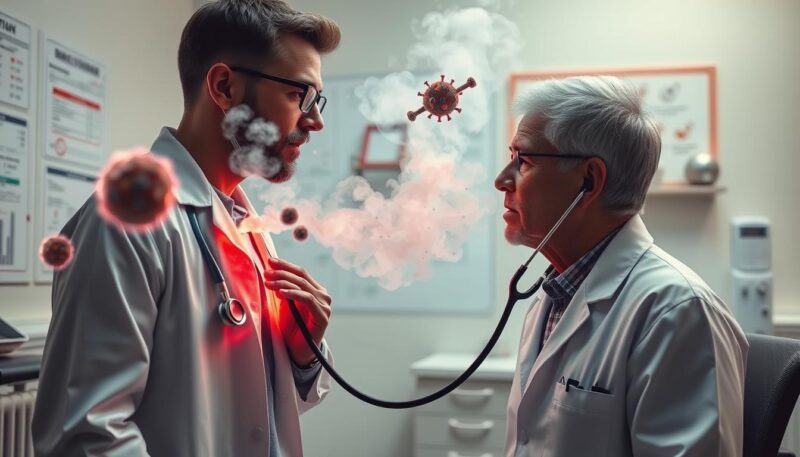As a vaper, you may wonder if doctors and vaping detection go hand in hand. The answer is yes, doctors can tell if you vape through various medical tests and physical examinations. Nicotine medical impact is a significant concern, and healthcare providers need to be aware of your vaping habits to provide accurate diagnoses and treatments. Doctors and vaping detection is a crucial aspect of medical exams, as it can help identify potential health risks associated with vaping.
When you visit your doctor, they may ask you about your vaping habits as part of their assessment. This is because nicotine can be detected in the body for several days after use, and doctors need to consider this when evaluating your overall health. Can doctors tell if you vape? The answer is yes, and it’s essential to be honest with your healthcare provider about your vaping habits to ensure you receive the best possible care. Nicotine medical impact can be significant, and doctors need to be aware of your vaping habits to provide personalized advice and treatment.
Doctors can detect vaping through various medical tests, including blood tests, urine tests, and physical examinations. These tests can help identify the presence of nicotine and its metabolites in the body. Nicotine medical impact can be significant, and doctors need to consider this when evaluating your overall health. By being honest with your healthcare provider about your vaping habits, you can ensure you receive the best possible care and advice on how to manage your health.
Understanding how doctors and vaping detection work can help you make informed decisions about your health. Nicotine medical impact is a significant concern, and healthcare providers need to be aware of your vaping habits to provide accurate diagnoses and treatments. By being open and honest with your doctor, you can ensure you receive personalized advice and treatment to help you manage your health and reduce the risks associated with vaping. Doctors and vaping detection is an essential aspect of medical exams, and it’s crucial to be aware of the potential health risks associated with vaping.
Medical Tests That Can Detect Vaping Use
When it comes to vaping health exams, doctors use various methods to detect vaping use. Vaping detection by doctors often involves medical tests that can identify nicotine and cotinine in the body. Nicotine health effects can be severe, and early detection is crucial for preventing long-term damage.
Some common medical tests used to detect vaping include drug tests for substances like nicotine and cotinine. These tests can be performed in medical facilities or laboratories and can also be conducted at home using purchased kits. The detection window for nicotine exposure varies and is influenced by factors like the type, amount, and frequency of nicotine exposure.
Cotinine Testing and Detection Windows
Cotinine testing is a common method for detecting nicotine use. Cotinine can be detected in urine for about four days, in saliva for around 24 hours, and in hair potentially for several months. This makes cotinine testing a reliable method for detecting vaping use.
Physical Signs Doctors Look For
Doctors also look for physical signs that may indicate vaping use. These signs can include:
- Dry mouth
- Cavities
- Periodontitis
- Oral lesions
These symptoms can indicate vaping to medical professionals if found together.
Blood Test Indicators of Vaping
Blood tests can detect nicotine and cotinine in the body. Nicotine can only be detected in the body for a brief time period, with approximately half being eliminated about two hours after the last exposure. Cotinine levels remain detectable in urine and blood samples for up to seven days, providing a longer detection window compared to nicotine.
It’s essential to note that doctors are legally obligated to keep patient information, including vaping habits, confidential unless the patient expressly permits disclosure. Vaping can have various impacts on oral health, from easily treatable issues like dry mouth to more serious conditions such as extensive damage and potential cancer due to carcinogenic properties found in vape vapor.
Can Doctors Tell If You Vape During Routine Check-ups?
When you visit your doctor for a routine check-up, they may be able to detect vape use through physical examinations and medical tests. The detection of vaping use depends on various factors, including the frequency of use and the type of vaping device used. Doctors and vaping detection methods have become more advanced, allowing them to identify nicotine health effects and provide medical advice accordingly.
Some of the factors that can affect the detection of vaping use include age, body mass, frequency of use, hydration levels, physical activity, and genetics. Staying hydrated by drinking plenty of water aids in faster excretion of nicotine’s metabolic compounds. Eating a healthy diet rich in antioxidants can help the body eliminate nicotine faster. Regular exercise, particularly cardio or weights, can assist in removing traces of nicotine more quickly by promoting sweating.

Doctors may look for physical signs such as dry mouth, cavities, periodontitis, and lesions to determine if a patient vapes. Nicotine and cotinine, byproducts of vaping, can be detected in hair, saliva, and urine for varying durations after use. Vaping can lead to a range of oral health issues, from minor conditions like dry mouth to more severe consequences like potential cancer due to carcinogenic properties in vapor.
| Detection Method | Detection Time |
|---|---|
| Blood Test | Up to 10 days |
| Urine Test | Up to 4 days |
| Saliva Test | Up to 4 days |
| Hair Test | Up to 90 days |
It is essential to be honest with your healthcare provider about your vaping habits, as they can provide you with personalized medical advice and help you manage any potential health effects. By understanding the risks associated with vaping and seeking medical advice, you can take the first step towards a healthier lifestyle.
Conclusion: Being Honest With Your Healthcare Provider
As you navigate the complex world of vaping, it’s crucial to be open and honest with your healthcare providers. While can doctors tell if you vape, they can only provide the most effective care when they have a complete understanding of your vaping habits and overall health. By being transparent, you empower your doctor to guide you through the potential nicotine medical impact and help you make informed decisions about your well-being.
Vaping may have become increasingly popular, but the long-term vaping detection by doctors and health consequences are still emerging. Regular check-ups and honest communication with your healthcare team can help you stay informed, monitor any potential issues, and explore alternatives or cessation strategies that align with your goals. Remember, your doctor is your partner in maintaining your optimal health, so embrace the opportunity to work together towards a healthier future.
